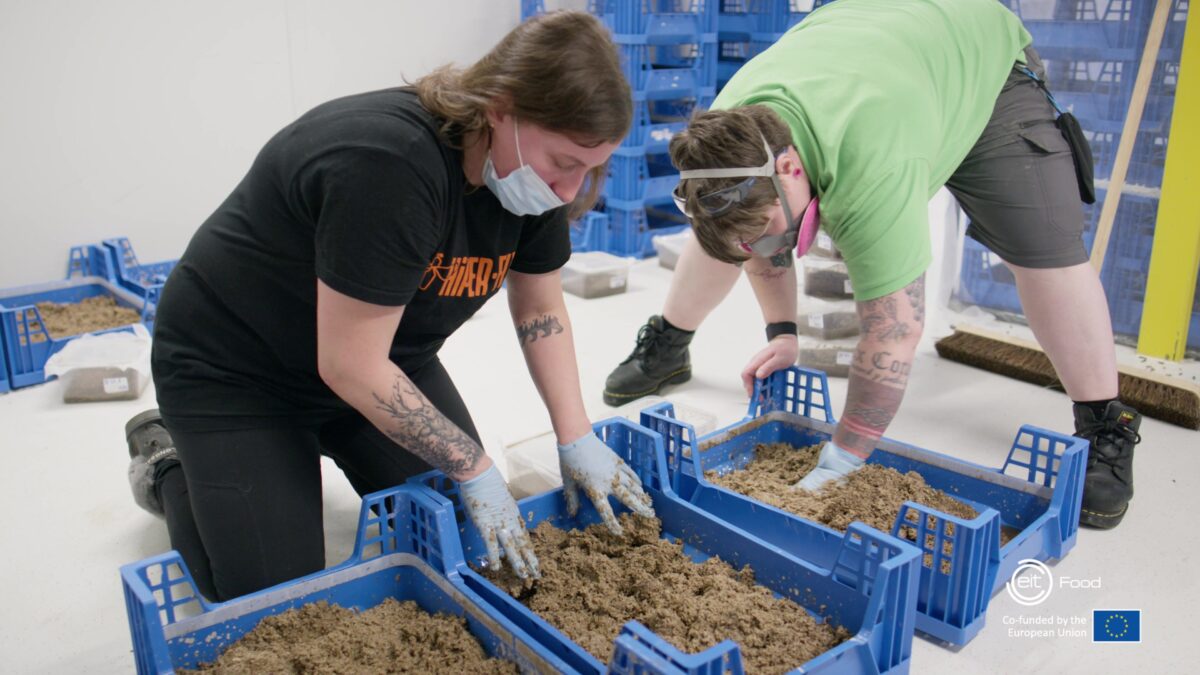Discover a Day in the Life of a Bug Breeder
In this blog, we explore a day in the life of a Bug Breeder who rears insects to be used as an alternative protein feed for animals on farms.

Our EIT Food Day in the Life series is an educational resource aimed at young people and professionals who are interested in the agrifood job market. We profile a wide range of careers in the agrifood sector, interviewing professionals to find out what their job is like, why it is important, and how you could take up the profession.
You will learn:
- What a typical day is like as a Bug Breeder
- The main responsibilities of a Bug Breeder
- Why this industry matters to our wider food system
- How you can take up this career path
Meet Lindy Stewart, an insect producer at Beta Bugs, which is an insect genetics company that develops and distributes black soldier fly to the insect farming sector.
Lindy tells us about her job as a Bug Breeder and how you can train to become one too.

What does a typical day as a Bug Breeder involve?
A Bug Breeder or insect producer helps to create sustainable animal feed for pigs, chickens and fish. Lindy produces black soldier fly and enhances their performance. The standard procedure to do this is by catching eggs from the flies, waiting for them to hatch, feeding them, and then growing them into large larvae.
At Beta Bugs, the team use a selective breeding technique to breed black soldier fly that have desirable characteristics. This includes traits such as protein content, survivability and fast growth. This helps Lindy to choose the flies with the best genetics to be sent to multiplier sites where they will be mass produced. These eggs are then distributed to Beta Bugs customers, including farmers that can use the eggs to feed to their animals.
On a day-to-day basis, Lindy looks after the bugs by feeding them and treating them as if they were any other pet. By caring for the Black Soldier Fly, Lindy can “take a standard fly and make it into a super fly by choosing the best bugs and breeding them together!”

How does a career as a Bug Breeder support the wider food industry?
Breeding bugs provides a sustainable alternative protein to feed to our animals, to reduce our reliance on unsustainable alternatives such as soymeal and fishmeal which contribute to deforestation, overfishing and biodiversity loss. The role of a Bug Breeder is important to help produce insects that require less land, food and water than other feed sources. Insect producers also support other sectors within the wider food industry including farmers, pet food manufactures and even breweries.
Lindy mentions, “We will provide farms with our eggs so they can mass rear the larvae. Pet food manufacturers will source their feed ingredients from these farms.”
“You need a fraction of the space you need to get the amount of protein from your soya field as you do from the insects.”
The feed given to the flies at Beta Bugs is spent grains from a local brewery. Spent grains are a mixture of any grains such as barley, wheat and corn which are used when making beer. Leftovers usually would be paid to be disposed of, yet Beta Bugs take the waste grain for free to feed their bugs, saving the brewery money in the process.
Lindy mentions that “We want to provide a sustainable solution that we can work into a circular economy”, which enables businesses to come together to produce food more sustainably.

How can I get involved in this area? What are the pathways into this role?
There are multiple pathways to explore if you would like to become a bug breeder.
Lindy notes that: “If you have an interest in sustainability, the planet, animals, bugs, or anything (similar), you could volunteer and get some work experience.
Because this is a new industry, no one knows how to mass rear black soldier fly in an industrial setting, so the opportunities are endless.”
University degrees are also a great option. By studying a biological degree, an entomology degree or food science degree, you will gain the skills and knowledge to help you kickstart your career in the industry. Relevant courses are also an option instead of a degree.

What is the best part of the job?
Meeting new people and building relationships is something that Lindy values as part of her job as a Bug Breeder.
“The main aspect of my job at the moment that I love is building relationships with customers and meeting chicken farmers who have never thought about breeding insects before, but now they do because they can see where the future of farming is going.”
She also enjoys knowing that her job creates a positive impact for the planet. “No matter what we do, if we make an improvement in that day (which we do in some aspect of the company) we are making an actual improvement on the planet.
That’s really what I think keeps me so happy and excited in this job because no matter how bad of a day you're having, you’ve made a difference.”
She sums up her role as Bug Breeder in three words:
Exciting, challenging and (extremely) rewarding.

About EIT Food’s Day in The Life series
EIT Food’s Day in the Life Series is a video series that explores the variety of careers that our agrifood system has to offer. The aim of the series is to raise awareness of the range of high-skilled and highly rewarding jobs that the food and farming sector has to offer and inspire younger generations to consider one of these careers for themselves.
More blog posts by EIT Food West


Reformulating with the community in mind
